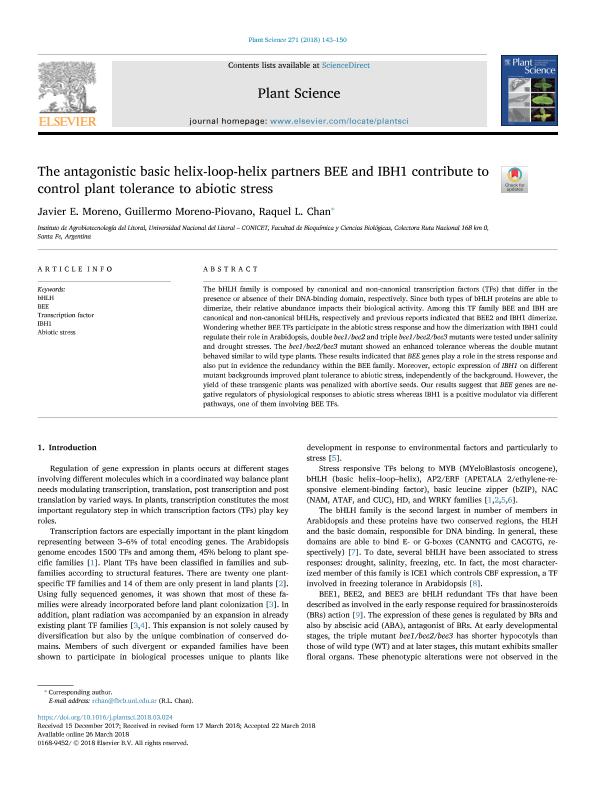Mostrar el registro sencillo del ítem
dc.contributor.author
Moreno, Javier Edgardo

dc.contributor.author
Moreno Piovano, Guillermo Samuel

dc.contributor.author
Chan, Raquel Lia

dc.date.available
2019-10-18T20:20:23Z
dc.date.issued
2018-06
dc.identifier.citation
Moreno, Javier Edgardo; Moreno Piovano, Guillermo Samuel; Chan, Raquel Lia; The antagonistic basic helix-loop-helix partners BEE and IBH1 contribute to control plant tolerance to abiotic stress; Elsevier Ireland; Plant Science; 271; 6-2018; 143-150
dc.identifier.issn
0168-9452
dc.identifier.uri
http://hdl.handle.net/11336/86492
dc.description.abstract
The bHLH family is composed by canonical and non-canonical transcription factors (TFs) that differ in the presence or absence of their DNA-binding domain, respectively. Since both types of bHLH proteins are able to dimerize, their relative abundance impacts their biological activity. Among this TF family BEE and IBH are canonical and non-canonical bHLHs, respectively and previous reports indicated that BEE2 and IBH1 dimerize. Wondering whether BEE TFs participate in the abiotic stress response and how the dimerization with IBH1 could regulate their role in Arabidopsis, double bee1/bee2 and triple bee1/bee2/bee3 mutants were tested under salinity and drought stresses. The bee1/bee2/bee3 mutant showed an enhanced tolerance whereas the double mutant behaved similar to wild type plants. These results indicated that BEE genes play a role in the stress response and also put in evidence the redundancy within the BEE family. Moreover, ectopic expression of IBH1 on different mutant backgrounds improved plant tolerance to abiotic stress, independently of the background. However, the yield of these transgenic plants was penalized with abortive seeds. Our results suggest that BEE genes are negative regulators of physiological responses to abiotic stress whereas IBH1 is a positive modulator via different pathways, one of them involving BEE TFs.
dc.format
application/pdf
dc.language.iso
eng
dc.publisher
Elsevier Ireland

dc.rights
info:eu-repo/semantics/openAccess
dc.rights.uri
https://creativecommons.org/licenses/by-nc-sa/2.5/ar/
dc.subject
BHLH
dc.subject
Transcription factor
dc.subject
IBH
dc.subject
Abiotic stress
dc.subject.classification
Bioquímica y Biología Molecular

dc.subject.classification
Ciencias Biológicas

dc.subject.classification
CIENCIAS NATURALES Y EXACTAS

dc.title
The antagonistic basic helix-loop-helix partners BEE and IBH1 contribute to control plant tolerance to abiotic stress
dc.type
info:eu-repo/semantics/article
dc.type
info:ar-repo/semantics/artículo
dc.type
info:eu-repo/semantics/publishedVersion
dc.date.updated
2019-10-18T18:43:56Z
dc.journal.volume
271
dc.journal.pagination
143-150
dc.journal.pais
Irlanda

dc.description.fil
Fil: Moreno, Javier Edgardo. Consejo Nacional de Investigaciones Científicas y Técnicas. Centro Científico Tecnológico Conicet - Santa Fe. Instituto de Agrobiotecnología del Litoral. Universidad Nacional del Litoral. Instituto de Agrobiotecnología del Litoral; Argentina
dc.description.fil
Fil: Moreno Piovano, Guillermo Samuel. Consejo Nacional de Investigaciones Científicas y Técnicas. Centro Científico Tecnológico Conicet - Santa Fe. Instituto de Agrobiotecnología del Litoral. Universidad Nacional del Litoral. Instituto de Agrobiotecnología del Litoral; Argentina
dc.description.fil
Fil: Chan, Raquel Lia. Consejo Nacional de Investigaciones Científicas y Técnicas. Centro Científico Tecnológico Conicet - Santa Fe. Instituto de Agrobiotecnología del Litoral. Universidad Nacional del Litoral. Instituto de Agrobiotecnología del Litoral; Argentina
dc.journal.title
Plant Science

dc.relation.alternativeid
info:eu-repo/semantics/altIdentifier/url/http://linkinghub.elsevier.com/retrieve/pii/S0168945217312074
dc.relation.alternativeid
info:eu-repo/semantics/altIdentifier/doi/http://dx.doi.org/10.1016/j.plantsci.2018.03.024
Archivos asociados
